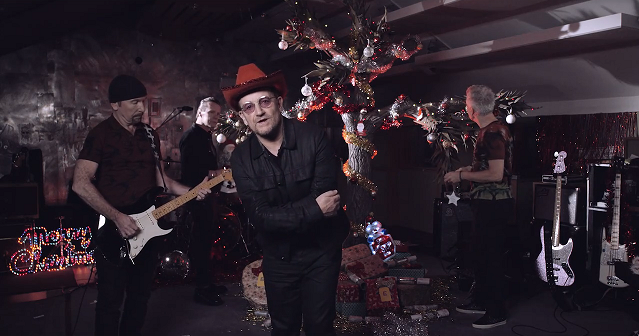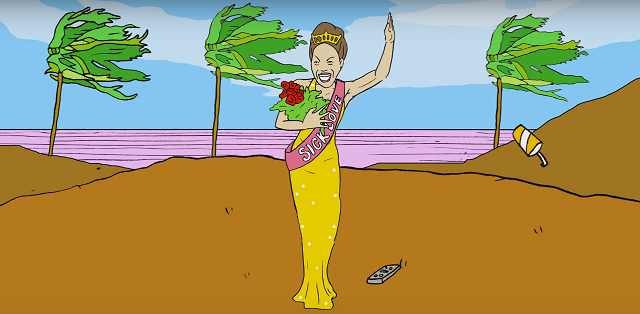U2: Trying To Throw Their Arms Around The World
They’re the biggest band left on Earth, but for U2, that’s not nearly enough. Inside their impossible quest
It’s been only a few days since U2 pulled off the most audacious stunt of a four-decade career that’s never been short on auÂdacity, teaming with Apple to make Songs of Innocence available for free to every iTunes user. The gift sparked an instant, noisy, sometimes kinda-hysterical backlash: The Washington Post called the album “dysÂtopian junk mail”; The New Yorker railed against a “lack of consent”; tech writers used terms like “spam” and “malware” and “dad rock”; a shocking number of kids on Twitter revealed themselves to be unaware of U2’s existence altogether. The narrative seemed to shift by mid-October, when Apple reÂvealed that more than 80 million people listened to at least some of the album, but then Bono seemed to flat-out call the whole deal a mistake in a Facebook chat with fans. “Oops,” he said. “I’m sorry about that.”
“I’ve said this many times,” Bono says, “but, you know, in America, you look up at the mansion on the hill and you say, ”˜One day, if I work really hard, I might get to live there.’ In Ireland, particularly in Dublin, you look at the mansion and you say, ”˜One day, I’m going to get that bastard.’ That’s a great preparation for life on the Internet.”
We’re approaching one of Dublin’s most-trafficked thoroughfares, Grafton Street, where Bono recalls driving around in an orange VW Beetle, the Edge’s mom at the wheel ”“ “she was our first roadie” ”“ with rolls of wallpaper advertising U2 that they’d paste over all the other posters, including other bands’. “Our original name was the Hype, I’ll have you know. We kind of thought that was part of what punk rock was: getting in people’s faces. So we shouldn’t be surÂprised when they want to get back in ours.
“I take some pride in being divisive,” he says, leaning back in his seat, “what Lee ”˜Scratch’ Perry would call ”˜a great upsetÂter.’ All my heroes were like that. But I do appreciate that I might have an extra-special annoying gene, which really helps me in this pursuit. At my most nervous, I will smirk, and you do want to wipe that smirk off the other fellow’s face sometimes. It’s very easy to look at U2 and go, ”˜There’s no junkies in the band as far as we can tell, no one is dead or dying, and they seem to like each other and are in love with their wives. I’ve had it! Get them out of my face!’
“The thing I hold onto most tightly during a shitstorm like we had last week,” he conÂtinues, “apart from an umbrella, is the direct line of conversation we have with our audiÂence, who I think have a sense of who we are through this very intimate music we’ve been making over the years.”
We’re arriving at the pub, Grogans, where local artists’ paintings cover every available spot on the walls. “Low-profile vibes,” Bono tells his security guy, as we take a corner
table that’s been magically held for us. We’re quickly joined by a friendly woman in a purÂple sweater, Lucy Matthew, who’s a key figÂure in Bono’s nonmusical life: She helped set up his ONE and (RED) campaigns and aids him in his activism. “Lucy is the reason some people think I’m clever,” says Bono. “Moving through different worlds, she’s the reason. She doesn’t think there’s anything unusual about the fact that I’m interested in lots of stuff ”“ which I do know puzzles people, the multiple-personality disorders.
“It’s all the zeitgeist, and you chase the zeitgeist. Sometimes it’s in technology, sometimes it’s in culture, in music, in fashÂion, in politics, in science. The zeitgeist is the thing. And I don’t know an artist that isn’t interested in it ”“ but it isn’t just happening in culture.” Picking up speed, Bono delivÂers the following impressive mouthful in all of 20 seconds: “Painters met in Paris in the start of the 20th century, and it wasn’t just painting. Einstein delivers his theory of relaÂtivity, 1905. You have the Bolshevik RevoluÂtion because of those incendiary tracts writÂten by Karl Marx. You have the first Cubist exhibition in Paris. And they’re all related, because, what is the theory of relativity? An object changes shape at the speed of light. So now a face can look like that, because a face is no longer what we see.”
He returns, without tranÂsition, to his own life. “I need to do things in order to learn them,” he says. “Entering polÂitics and trying to understand that, that’s made a lot of eneÂmies. The lovers and the haters ”“ they’ve swelled their ranks over the years. I’ve made my life difÂficult for my bandmates, I really have. But my wanderlust, if you want to call it that, is just at the very heart of who I am. And even commerce, to understand comÂmerce ”“ I think that’s very imporÂtant. If you told me 20 years ago that commerce took more people out of poverty than aid and deÂvelopment, I’d have scoffed. So if I see technology is transforming music, I have to learn it, so I dive into it. I know it can confuse people, and they think that I’ve lost interest in being an artist. But that is what I think an artist is.”
One thing Bono says he didn’t quite unÂderstand: the fact that Songs of Innocence would automatically download itself onto some people’s phones. “It’s like we put a bottle of milk in people’s fridge that they weren’t asking for,” he says. “It is a gross invasion!” He smiles. “But it was kind of an accident. The milk was supposed to be in the cloud. It was supposed to be on the front doorstep.”
Some pints arrive, and Bono cackles when I show him a viral joke GIF that disÂplays a supposed new iPhone OS, with his face on every icon. He points out, with some pride, that his silhouette has actually been on the iPhone’s Music app (under the “ArtÂists” icon) for years. “I’ve hacked into you beÂfore you even knew,” he says. “I’ve been lookÂing at you every time you pressed ”˜Music.’ Like, every time you’re pressing on my head. How do you think that feels? It’s a bruising encounter for me.”
Mullen, the band’s other alpha male, is least bruised by the backlash: “I couldn’t give a rat’s ass,” he says. “I really couldn’t.” He’s all hard edges, Mullen, from his haircut to his jutting cheekbones to his best-in-band physique. He bristles at his repuÂtation as the band’s designated contrarian, and he may be its most essential protector, torpedoing ideas like making Bono and the Edge’s ill-fated Spider-Man: Turn Off the Dark soundtrack a U2 album. “It’s all about instinct,” says Mullen. “There are lines I won’t cross, but I think the most dangerÂous thing is not to have the debate. With the Apple thing, I had questions about it, but it was kind of a no-brainer: They want to buy your album, and they want to give it to peoÂple for free.”
Clayton, the only member of U2 whose personality could be plausibly described a s “ laid  back ,” has the most idiosyncratÂic take. “These digital, online companies cross borders,” he says, deliÂcately sampling an anÂtipasto platter at a DubÂlin restaurant where a signed October-era picÂture of his band hangs on the wall, featuring a decades-younger ClayÂton with an awesomely buoyant New Wave hairÂdo. “They have infiniteÂly more power than any traditional corporation. From our point of view, we got our record out to as many people as possiÂble. What I’m saying is, look, that power is there. And blaming us for pointing it out seems to be a case of shooting the messenger, really.”
Bono dreamed up the Apple scheme with U2’s new manager, Guy Oseary, who took over after longtime manager Paul McGuinÂness stepped down in 2013. “We’d been talkÂing: How do you use this technology?” Bono says. “Because it’s using us. So there must be a way to get these songs out to people who may not even know we’re there. You know, people have gone to college and left without a U2 album. We had to start again. At the very core of who we are is that yearning for new ears, new eyes, new hearts.”
Bono then brought the plan to Apple CEO Tim Cook: They had a pre-existing relationship, in part because Apple has raised around $76 million for (RED). (Though new Apple employee and longtime associate Jimmy Iovine closely followed the making of this album, he insists he had no connection to the release plan.) The Apple/ U2 relationship had been rudely interruptÂed when U2 went to BlackBerry for sponsorÂship of their 360° Tour in 2009. They did so, Bono says, in the wake of an argument (the words “go fuck yourself ” were used) with the late Steve Jobs, who was a close friend. “I had a tantrum, like a child, and went to the competition,” Bono says with a shrug. To Jobs’ great credit, he adds, the company kept up its partnership with (RED), and the two men reconciled well before his passing.








